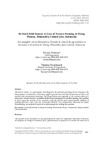Identificador persistente para citar o vincular este elemento:
https://accedacris.ulpgc.es/jspui/handle/10553/77686
| Campo DC | Valor | idioma |
|---|---|---|
| dc.contributor.author | Wahono, Francis | en_US |
| dc.contributor.author | Puspitawati, Theresia | en_US |
| dc.date.accessioned | 2021-02-10T17:09:57Z | - |
| dc.date.available | 2021-02-10T17:09:57Z | - |
| dc.date.issued | 2021 | en_US |
| dc.identifier.issn | 1133-598X | en_US |
| dc.identifier.uri | https://accedacris.ulpgc.es/handle/10553/77686 | - |
| dc.description.abstract | “Be kind to nature” is a prescription describing how the peasants practising terrace farming in the Dieng plateau in Central Java, Indonesia, might overcome and even halt the processes of heavy soil erosion in the mountainous landscape. The Dieng Plateau was originally a vast, ancient caldera of a semi-active volcano that now constitutes fertile terrain endangered by modern farming. Our question is: based upon the wisdom of our ancestors, could the old but more nature-friendly methods of farming represent a new, wise and sustainable solution? Two communities, Sikunang and Upper Wadaslintang, are analysed to provide us with prompts for tackling this question. | en_US |
| dc.description.abstract | «Sea amable con la naturaleza» es una prescripción de cómo los campesinos cultivando en terrazas del altiplano de Dieng en Indonesia (Java) pueden frenar los procesos de erosión del suelos en el paisaje de montañas. El Altiplano de Dieng originalmente fue una caldera amplia ancestral de un volcán semi-activo que ahora forma un terreno fértil amenazado por la tecnología de la agroindustria. Nuestra pregunta es –aprendiendo de la sabiduría de los ancestros– si las técnicas agrícolas antiguas y mas amables con la naturaleza pueden ser la nueva solución sostenible y sabia?. Dos comunidades, Sikunang y Wadaslinang Alto, nos brindan elementos para iluminar el caso. | en_US |
| dc.language | eng | en_US |
| dc.relation.ispartof | Vegueta: Anuario de la Facultad de Geografía e Historia | en_US |
| dc.source | Vegueta: Anuario de la Facultad de Geografía e Historia [ISSN 1133-598X], v. 21 (1), p. 303-317 | en_US |
| dc.subject | 540402 Geografía rural | en_US |
| dc.subject | 550301 Historia local | en_US |
| dc.subject | 510201 Agricultura | en_US |
| dc.subject.other | Ancestral Wisdom | en_US |
| dc.subject.other | Ecological Farming | en_US |
| dc.subject.other | Biodiversity Piracy | en_US |
| dc.subject.other | Community Empowerment | en_US |
| dc.subject.other | Conscientization | en_US |
| dc.subject.other | Sabiduría ancestral | en_US |
| dc.subject.other | Agricultura ecológica | en_US |
| dc.subject.other | Biopiratería | en_US |
| dc.subject.other | Empoderamiento de la comunidad | en_US |
| dc.subject.other | Concienzación | en_US |
| dc.title | Be Kind With Nature: A Case of Terrace Farming in Dieng Plateau, Wonosobo, Central Java, Indonesia | en_US |
| dc.title.alternative | Sea amigable con la Naturaleza: Estudio de caso de la agricultura en terrazas en la meseta de Dieng, Wonosobo, Java Central, Indonesia | en_US |
| dc.type | info:eu-repo/semantics/article | en_US |
| dc.type | Article | en_US |
| dc.identifier.doi | 10.51349/veg.2021.1.12 | en_US |
| dc.description.lastpage | 317 | en_US |
| dc.description.firstpage | 303 | en_US |
| dc.relation.volume | 21 | en_US |
| dc.investigacion | Artes y Humanidades | en_US |
| dc.type2 | Artículo | en_US |
| dc.utils.revision | Sí | en_US |
| dc.identifier.ulpgc | Sí | en_US |
| dc.description.sjr | 0,197 | |
| dc.description.sjrq | Q1 | |
| dc.description.esci | ESCI | |
| dc.description.fecytq | Q2 | |
| dc.description.fecytpuntuacion | 38,28 | |
| dc.description.dialnetimpact | 0,0 | |
| dc.description.dialnetq | Q1 | |
| dc.description.dialnetd | D2 | |
| dc.description.miaricds | 10,0 | |
| dc.description.erihplus | ERIH PLUS | |
| item.grantfulltext | open | - |
| item.fulltext | Con texto completo | - |
| Colección: | Artículos | |
Citas de WEB OF SCIENCETM
Citations
1
actualizado el 15-feb-2026
Visitas
62
actualizado el 10-ene-2026
Descargas
40
actualizado el 10-ene-2026
Google ScholarTM
Verifica
Altmetric
Comparte
Exporta metadatos
Los elementos en ULPGC accedaCRIS están protegidos por derechos de autor con todos los derechos reservados, a menos que se indique lo contrario.
